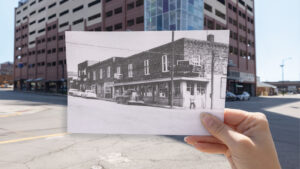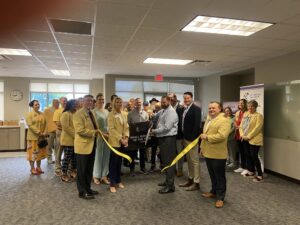But how accurate is the perception that COMO is run amok with bad guys?
Less than twenty-four hours after the polls closed on April 8 with incumbent Barbara Buffaloe easily turning back two challengers to win another term as Columbia’s mayor, the city witnessed the start of a spate of violent crime that spanned shootings, a stabbing, and multiple arrests and charges.
The timing was especially notable considering that crime — and the need to hire more police officers — was the hot topic during the sometimes-contentious mayoral race that featured runner-up candidate Blair Murphy raising more than $250,000 in his bid to unseat Buffaloe. Buffaloe garnered 14,073 votes, Murphy had 10,663 votes, and Tanya Heath received 779 votes.
The municipal election also came just a few weeks after the Columbia Police Department released updated crime statistics for 2024 that showed most categories of crime have actually decreased, and that arrests for the most violent crimes, including homicide, have increased.
But the days immediately following the election required substantial police resources in responding to 911 calls.
On April 9, Columbia police responded to an armed robbery in the 1400 block of Rangeline Street. A suspect in the alleged crime was arrested six days later on charges of first-degree robbery, unlawful use of a weapon, and armed criminal action.
At about 10:40 p.m. on April 11, police responded to a report of shots fired in the 2700 block of Maguire Boulevard. A man reportedly fired a weapon at several people, and one person was struck in the leg. Two days later, a Boone County sheriff’s deputy making a traffic stop in Sturgeon identified the 20-year-old driver as a suspect wanted in connection to that shooting. The suspect was arrested on charges of first-degree assault, fourth-degree assault, unlawful use of a weapon, and armed criminal action.
At around 10:30 p.m. Saturday, April 12, at Cosmo Park, two people — one man and one woman — were shot in a hail of gunfire, and both were taken to a local hospital. A news release said the man was in stable condition and the woman was in serious condition.
A few hours later, at around 1:30 a.m. Sunday, April 13, a Columbia police officer witnessed a shooting downtown near the corner of Ninth and Broadway. Two juvenile males were taken into custody, and two adult men were both hospitalized and were in stable condition.
Then on Monday, April 14, police responded to an assault in the 2900 block of Leeway Drive. A stabbing victim had non-life-threatening injuries, and a 70-year-old man was arrested on charges of first-degree assault, armed criminal action, and unlawful use of a weapon.
Meanwhile, police officials said while the Columbia Police Department is understaffed, the crimes are still under investigation or suspects have already been identified and arrested. That stretch of police activity came on the heels of the mid-March seizure of thirty-four stolen firearms, resulting in the arrests of eight people on more than 100 collective criminal charges. Police said the stolen guns had come from another community but were sold to individuals who by law were prohibited from owning weapons.
And just a week before the election, two Columbia police officers who were on an overtime assignment downtown, saw a suspect shoot toward a vehicle. The suspect was arrested and the gun was identified as stolen.
Though that incident captured a bevy of social media attention as a supposed example of rising crime downtown, police said it illustrated something else.
“That’s how local policing is supposed to work,” said Police Chief Jill Schlude. “People are going to commit crimes even if a police officer is standing right there.” The ensuing all-hands-on-deck response from other agencies, including the Boone County Sheriff’s Office, the Missouri Highway Patrol, and Ashland Police Department, was also an example of how other agencies assist when called on. Schlude added, “I’m incredibly grateful for our partners responding the way they did.”
But Schlude is also the first to sound the alarm that CPD is understaffed and that retaining trained officers continues to be a challenge, though the actual picture is different from some of the public narratives that fail to recognize how those factors have improved. For instance, when Schlude became police chief in December 2023, the department had close to forty vacancies. On April 1, 2025, the department had sixteen vacancies, or an 8 percent vacancy rate. And during the most recent job postings for additional officers, Schlude said the department received fifty applications. Some of those jobseekers are officers who are transferring or wanting to come in as “lateral hires,” which means they don’t have to go through the department’s police academy that began last summer.
The new police academy recently graduated its first class of fourteen recruits, and another class is currently in session, with a third class getting started this summer.
The retention question seems more complicated to answer. Although new CPD hires start at a salary of $60,000, lack of full funding for the police pension fund and twelve-hour shifts that are necessary because of understaffing are challenges for keeping cops from going to other cities.
“The frustration that I feel is that we’ve been at a point, probably the past seven or eight years, where we’ve really started seeing more people leaving the department,” Schlude said.
In fiscal year 2022, twenty-three officers left CPD and nineteen were hired. In 2023, twenty-four left and ten were hired. The trend is a reverse from previous years. In 2014, the department saw ten officers leave, but twenty-six were hired. In 2016, nineteen left and seventeen were hired.
“We got into this pattern where we’re not making a lot of headway,” she added. “Those vacancies really start stacking up.”
Schlude said she is confident that the department could be at “full strength” with 194 officers and staff by the end of the calendar year. She and her command staff determined, however, that the department needs fifty-one new officers, not just the sixteen that would bring the roster to 194.
“The undercurrrent of frustration is that we’re a reactive police department, and we have been for several years,” she said. “You really have no other alternative when you don’t have staffing. You’re just trying to get through the day, answer the 911 calls. That frustrates the public and it frustrates the police officers.”
A recent city survey of Columbia residents showed that public safety and a desire for greater police visibility are among the public’s highest priorities. Schlude acknowledged that survey by noting that residents want the special CPD downtown unit back, “which I’m totally for.”
She continued, “But we have to have staffing. Officers in the park? We have to have the staff.”
But what about that new crime report? Schlude unveiled a new crime report that uses an improved methodology to report crimes. That will also lead to an online dashboard for the public to see real-time updates as early as this summer. The new reporting method put crimes into the categories of crimes against persons, crimes against property, and crimes against society. In all three areas, crime went down in 2024 compared to 2023.
Crimes against property decreased 7.27 percent and crimes against society — such as drugs and weapons crimes — decreased by 2.25 percent. Meanwhile, crimes against persons declined 3.5 percent.
But statistics do not take into account that the police department has not grown commensurately with the city’s population growth, which is around 2.25 percent annually. Schlude said the city must take that growth into account, noting that the 194 positions she can staff is the number that the City Council has authorized. And that number includes thirteen offficers at Columbia Regional Airport and four park rangers.
“We can’t hire any more police officers unless the city gives us more positions,” she said, explaining that a lack of future planning has also “permeated” other city needs, such as electric utility infrastructure, water towers, and street repairs.
“There’s this general feeling that we don’t have a master plan,” Schlude said. “I think that’s what we hear the public asking for.”










